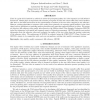Free Online Productivity Tools
i2Speak
i2Symbol
i2OCR
iTex2Img
iWeb2Print
iWeb2Shot
i2Type
iPdf2Split
iPdf2Merge
i2Bopomofo
i2Arabic
i2Style
i2Image
i2PDF
iLatex2Rtf
Sci2ools
109
click to vote
HVEI
2009
2009
Motion-based perceptual quality assessment of video
There is a great deal of interest in methods to assess the perceptual quality of a video sequence in a full reference framework. Motion plays an important role in human perception of video and videos suffer from several artifacts that have to deal with inaccuracies in the representation of motion in the test video compared to the reference. However, existing algorithms to measure video quality focus primarily on capturing spatial artifacts in the video signal, and are inadequate at modeling motion perception and capturing temporal artifacts in videos. We present an objective, full reference video quality index known as the MOtion-based Video Integrity Evaluation (MOVIE) index that integrates both spatial and temporal aspects of distortion assessment. MOVIE explicitly uses motion information from the reference video and evaluates the quality of the test video along the motion trajectories of the reference video. The performance of MOVIE is evaluated using the VQEG FR-TV Phase I dataset...
Related Content
| Added | 18 Feb 2011 |
| Updated | 18 Feb 2011 |
| Type | Journal |
| Year | 2009 |
| Where | HVEI |
| Authors | Kalpana Seshadrinathan, Alan C. Bovik |
Comments (0)

